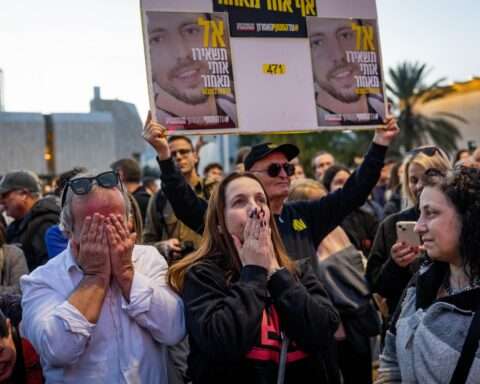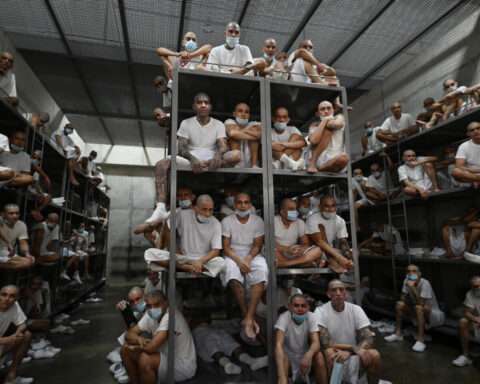In a contentious ruling, a Louisiana immigration judge has declared that Mahmoud Khalil, a Columbia University graduate and pro-Palestinian activist, can be deported, marking a significant victory for the Trump administration’s crackdown on campus dissent.
The decision, based on claims that Khalil’s activism poses a threat to U.S. foreign policy, has ignited fierce debates over free speech and immigration law, with his legal team vowing to fight on. This article delves into the case’s origins, the hearing’s fallout, and the broader implications for activists nationwide.
The ruling came to light on April 12, 2025, during a heated session at the LaSalle Immigration Court in Jena, Louisiana. Khalil, a 30-year-old legal permanent resident, was arrested in March for his role in 2024 protests against Israel’s war in Gaza, which the administration alleges undermines U.S. interests. While a federal judge in New Jersey has temporarily blocked his removal, the Louisiana decision escalates a legal saga that tests the boundaries of constitutional protections and executive power.
A Campus Leader Caught in the Crosshairs
Mahmoud Khalil, born in Syria and a citizen of Algeria, emerged as a prominent voice at Columbia University, where he earned a master’s degree in international affairs. As a lead negotiator for pro-Palestinian protests, he criticized U.S. support for Israel and Columbia’s financial ties to Israeli institutions. His activism, which included organizing encampments and speaking to media, drew the ire of the Trump administration, which labeled such demonstrations as antisemitic and aligned with Hamas, a designated terrorist group.
On March 8, 2025, Immigration and Customs Enforcement (ICE) agents detained Khalil at his university apartment in Manhattan, where he lived with his pregnant wife, Dr. Noor Abdalla, a U.S. citizen. Initially held in New Jersey, he was transferred to a remote ICE facility in Jena, Louisiana, over 1,300 miles from home. The administration cited a rarely used provision of the 1952 Immigration and Nationality Act, allowing the Secretary of State to deport noncitizens whose presence could have “serious adverse foreign policy consequences.”
The Louisiana Ruling: Khalil Can Be Deported
Judge Jamee E. Comans delivered the ruling after a nearly two-hour hearing, affirming that a memo from Secretary of State Marco Rubio provided sufficient grounds for Khalil’s deportation. The undated memo claimed Khalil’s “beliefs, statements, or associations” compromised U.S. efforts to combat antisemitism and protect Jewish students, despite acknowledging his actions were “otherwise lawful.” Comans called the government’s case “facially reasonable,” granting Khalil until April 23 to seek relief or face removal to Syria or Algeria.
Khalil’s legal team, including attorneys from the ACLU and the Center for Constitutional Rights, decried the decision as a “charade of due process.” They argued that Rubio’s memo lacked evidence of criminal conduct, relying solely on Khalil’s political speech. “This sets a dangerous precedent,” said attorney Marc Van Der Hout. “If Mahmoud can be deported for his views, anyone’s free speech is at risk.” Khalil himself addressed the court, quoting Comans’s earlier emphasis on due process: “Clearly, neither of these principles were present today.”
A Parallel Fight in New Jersey
While the Louisiana ruling advances the administration’s agenda, a federal case in New Jersey offers Khalil a lifeline. U.S. District Judge Michael Farbiarz has barred his deportation pending a habeas corpus petition challenging the legality of his detention. The petition argues that targeting Khalil for protected speech violates the First Amendment, a claim bolstered by 150 immigration lawyers and scholars in an amicus brief. Farbiarz called the Louisiana decision “troubling” and scheduled further hearings to probe constitutional concerns.
The dual legal tracks highlight a jurisdictional tug-of-war. The administration sought to keep the case in Louisiana, known for its conservative judiciary, but New York Judge Jesse Furman transferred the habeas petition to New Jersey, where Khalil was briefly detained. His lawyers suspect the government moved him to Louisiana to avoid more liberal courts, a tactic they call “forum shopping.” The New Jersey case could ultimately halt deportation, but for now, Khalil remains in limbo.
The Administration’s Broader Crackdown
Khalil’s case is the spearhead of a wider campaign against pro-Palestinian activists. The Trump administration has targeted students and scholars like Rümeysa Öztürk at Tufts and Badar Khan Suri at Georgetown, accusing them of threatening national security through campus protests. President Trump, in a March 10 TruthSocial post, celebrated Khalil’s arrest as “the first of many,” vowing to deport “terrorist sympathizers.” The administration has also withheld $400 million in federal funding from Columbia, citing its failure to curb antisemitism.
Critics argue this reflects a chilling misuse of immigration law. The Immigration and Nationality Act’s foreign policy provision, invoked against Khalil, has been used only 15 times in 11.7 million cases since 1990, and never against a permanent resident for political speech, per the amicus brief. Legal scholars like Bill Hing question whether criticizing Israel’s actions in Gaza constitutes a foreign policy threat. “This is about silencing dissent,” said Ramzi Kassem, one of Khalil’s attorneys.
A Family’s Plight and Public Outcry
Khalil’s detention has left his wife, Dr. Abdalla, grappling with uncertainty as she nears childbirth. “Mahmoud was ripped away for no reason,” she said in a statement, recounting their confrontation with ICE agents during Ramadan. Community rallies outside the Jena facility and Columbia’s campus have drawn hundreds, with interfaith clergy reading messages of support. “Mahmoud’s fight is for all of us,” said a protester at a March 14 vigil.
The case has galvanized free speech advocates. The Foundation for Individual Rights and Expression called Khalil’s targeting a “crime” of holding a disfavored opinion. Jewish students and faculty at Columbia, some of whom reported harassment during protests, have expressed mixed views, with many opposing deportation as excessive. The controversy has also spurred congressional calls for oversight, with lawmakers like Representative Alexandria Ocasio-Cortez decrying “anti-Palestinian racism” in immigration enforcement.
Legal Hurdles and Possible Outcomes
Khalil’s team faces daunting challenges. In Louisiana, they plan to appeal to the Board of Immigration Appeals, arguing that Comans’s ruling sidestepped evidence and due process. They may also pursue asylum, citing risks Khalil faces in Syria or Algeria due to his activism. However, immigration courts, overseen by the Justice Department, often defer to executive authority, limiting judicial review. “The deck is stacked,” said Jonathan Turley, a constitutional law expert.
The New Jersey case offers greater hope, as federal courts can scrutinize First Amendment violations. A victory there could secure Khalil’s release and invalidate Rubio’s memo, potentially curbing the administration’s use of the foreign policy provision. Yet, prolonged litigation risks keeping Khalil detained, separated from his family and community. “We’re fighting on all fronts,” said attorney Baher Azmy, “but time is not on our side.”
A Test of American Values
Khalil’s case raises profound questions about the balance between security and liberty. Supporters of the administration, like Department of Homeland Security Secretary Kristi Noem, argue that deporting activists like Khalil protects U.S. interests, framing green cards as privileges, not rights. “Good riddance,” Noem posted on X after the ruling, echoing sentiment among some conservative circles. Others see a dangerous precedent, where dissent becomes grounds for exile.
Economically, the crackdown could deter international students, a $40 billion industry, while diplomatically, it strains U.S. credibility on free expression. For Khalil, the stakes are personal: reunion with his wife and unborn child or banishment to an uncertain fate. As his case reverberates, it challenges the nation to define the limits of protest in a polarized age.
A Nation Watches
The battle over Mahmoud Khalil’s fate is far from over, with appeals and federal hearings looming. His story, blending immigration, free speech, and geopolitics, underscores the fragility of rights in times of political fervor. Whether he prevails or is deported, the outcome will shape how America navigates dissent and diversity, with ripple effects for activists and immigrants alike.
Focus Keywords: Mahmoud Khalil, Louisiana immigration judge, deportation case, pro-Palestinian activist, Trump administration, free speech, Columbia University, Immigration and Nationality Act






